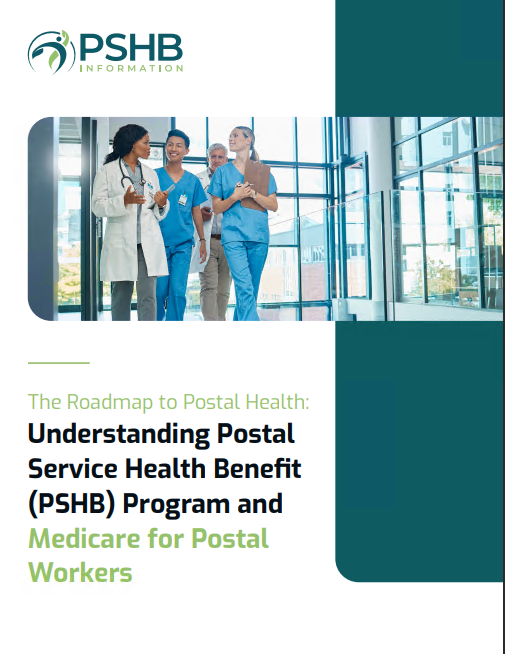Key Takeaways
-
Medicare Advantage (Part C) plans often come with extra perks, but many have limited coverage outside of your local area or service region. This can lead to surprise out-of-network costs when traveling or relocating.
-
If you’re a Postal Service annuitant or retiree considering PSHB alongside Medicare, it’s important to understand how Medicare Advantage may restrict your access to care while you’re away from home.
Medicare Advantage Basics and How It Differs from Original Medicare
Medicare Advantage, also known as Medicare Part C, is an alternative to Original Medicare. While Original Medicare includes Part A (hospital insurance) and Part B (medical insurance), Medicare Advantage bundles those parts and often includes additional benefits like dental, vision, and hearing coverage.
But there’s a tradeoff: Medicare Advantage plans are managed by private insurers, and most operate within restricted provider networks. That means your access to care may be tied to a specific geographic area—usually your home ZIP code or region.
For Postal Service retirees enrolled in the new Postal Service Health Benefits (PSHB) program, understanding the nuances of Medicare Advantage is critical, especially if you plan to travel frequently, relocate seasonally, or split time between different residences.
Why Medicare Advantage Plans May Not Be Travel-Friendly
Limited Service Areas
Most Medicare Advantage plans are local plans—they are designed to work within a defined geographic region, like a state, metro area, or county. If you travel outside your plan’s service area, your coverage may not go with you.
In-network providers are typically confined to a certain region, and visiting a provider outside that area can lead to:
-
Higher out-of-pocket costs
-
Denied claims for routine care
-
Limited access to specialists or hospitals
Emergency Coverage Does Not Mean Full Coverage
Medicare Advantage plans are required to cover emergency and urgent care anywhere in the U.S. However, this only includes:
-
Emergency room visits
-
Urgent care centers
-
Ambulance transport (when deemed medically necessary)
That does not mean you can access:
-
Follow-up visits
-
Routine checkups
-
Physical therapy or rehabilitation
These types of services are often not covered out-of-network, and you may have to return to your plan’s home region to receive them.
Out-of-Network Reimbursement Can Be Unpredictable
Some Medicare Advantage plans offer out-of-network benefits, but they are usually limited and may require prior authorization. These plans might cover a portion of the cost, but you’ll likely pay significantly more than you would in-network.
Moreover, even when out-of-network coverage is offered, it’s your responsibility to:
-
Ensure the provider bills correctly
-
Submit claims when needed
-
Track coverage rules specific to your plan
These extra hurdles can delay care or lead to surprise bills.
How This Affects PSHB Enrollees with Medicare
As of 2025, all Medicare-eligible Postal Service annuitants are required to enroll in Medicare Part B to maintain their PSHB coverage, unless they qualify for a specific exemption. If you also enroll in a Medicare Advantage plan, here’s what you need to think through:
-
Medicare Advantage becomes your primary coverage instead of Original Medicare.
-
If you move or travel frequently, especially outside your plan’s network, your coverage could suffer.
-
PSHB plans coordinate best with Original Medicare because of consistent national coverage and easier billing.
Frequent Travelers and Dual-State Residents: Key Considerations
If you spend significant time in multiple states or travel often, a Medicare Advantage plan might present complications you don’t anticipate.
-
You may need to switch plans every time you change residency or ZIP code, which can interrupt care.
-
Some services may require you to travel back to your plan’s home region for follow-up appointments or procedures.
-
While snowbirds or retirees with multiple homes used to manage with Medigap + Original Medicare, Advantage plans are less flexible.
Relocation and Plan Switching Rules
Medicare Advantage plans are bound by service area rules, meaning your plan is only valid where it’s licensed to operate. If you move:
-
You have a Special Enrollment Period (SEP) to switch plans.
-
The SEP lasts 2 months after your move to enroll in a new plan.
-
If you don’t enroll during this time, you could be left without coverage.
This process can be cumbersome, especially if you move temporarily, or split time between multiple addresses.
Comparing Travel Flexibility: Original Medicare vs. Advantage
Original Medicare offers nationwide coverage—you can go to any doctor or facility that accepts Medicare. This is a major benefit for:
-
Traveling retirees
-
Postal Service annuitants who visit family across the country
-
Those with second homes
In contrast, Medicare Advantage plans are usually restricted by region and provider networks. Even PPO (Preferred Provider Organization) plans, which offer more flexibility than HMOs, still prioritize in-network care.
This difference is why many PSHB enrollees with Medicare choose to pair Original Medicare with their PSHB plan, rather than enrolling in Medicare Advantage.
Prescription Drug Considerations When Traveling
If your Medicare Advantage plan includes Part D prescription drug coverage, that coverage might also be tied to your plan’s region. When traveling, this could mean:
-
Fewer participating pharmacies
-
Delays in getting prescriptions filled
-
Higher out-of-network drug costs
PSHB plans that integrate with Medicare and use an Employer Group Waiver Plan (EGWP) under Part D often offer broader pharmacy networks and better coordination—an important factor if you rely on medications.
PSHB and Medicare Advantage: Coordination Caveats
Although some PSHB plans are compatible with Medicare Advantage, most are built to coordinate with Original Medicare. Here’s why that matters:
-
Medicare Advantage takes the place of Original Medicare in billing.
-
That means PSHB becomes your secondary coverage, or in some cases, it may offer limited wraparound support.
-
You could lose out on features like deductible waivers, Part B premium reimbursements, or other enhanced cost-sharing benefits designed for those enrolled in Original Medicare.
If your PSHB plan offers those savings only when paired with Original Medicare, enrolling in Medicare Advantage could mean missing out.
What to Evaluate Before Choosing a Medicare Advantage Plan
If you’re considering a Medicare Advantage plan as a Postal Service retiree, ask yourself:
-
Do I plan to travel extensively in retirement?
-
Will I be living in more than one state throughout the year?
-
Am I comfortable staying within a defined network of providers?
-
How does the plan handle coverage outside my home area?
-
Will my PSHB benefits be limited if I choose Medicare Advantage?
You should also look at how the plan coordinates with:
-
PSHB premiums and cost-sharing
-
Access to specialists or referrals
-
Prescription drug coverage outside your home ZIP code
Why Original Medicare Remains the Preferred Option for Many PSHB Enrollees
The flexibility and predictability of Original Medicare make it more appealing for many Postal Service retirees, particularly those who want national access to care.
-
Original Medicare works with most providers across the U.S.
-
PSHB plans often offer better benefits when paired with Original Medicare
-
There are fewer billing complications or referral requirements
Pairing PSHB with Original Medicare allows you to benefit from both programs without losing travel flexibility or encountering unexpected limitations.
Think Ahead About Where Retirement May Take You
Your health coverage decisions in 2025 could impact your peace of mind for years to come. Medicare Advantage plans offer value in many cases, but they are not always suited for mobile retirees.
If you prioritize access to care in multiple states, across different providers, or while traveling, Original Medicare coordinated with a PSHB plan may offer more consistency and fewer surprises.
Your Long-Term Coverage Needs Deserve a Closer Look
The convenience of extra perks in Medicare Advantage plans may come at the cost of flexibility, especially if you travel frequently or live part-time in another state. As a Postal Service retiree or annuitant, don’t overlook how network restrictions and coordination issues could affect your overall health coverage under PSHB.
Before making any Medicare enrollment decision, speak with a licensed agent listed on this website to ensure your benefits align with your health, travel, and retirement lifestyle.








